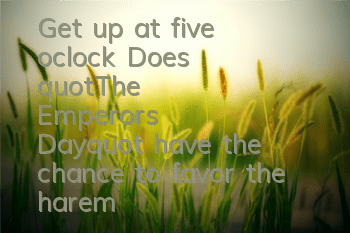Have you been an emperor? Are you interested in "The Emperor's Day"? It’s okay to calculate it, 5,000 years of history. Every emperor has been doing it for 20 years. I’ll go to 250 (this number~~~) A village is calculated based on the mainland population of 135.404 million in 2013. Oh my goodness! I'm still having fun? "The Emperor's Day" is enjoyable!
In the high red walls of the Forbidden City, when did the former emperor get up? What to do all day? Are you tired to be a good emperor? Recently, the first children's iPad version of the Palace Museum's official production, "The Emperor's Day", was officially released on the AppStore for free download. Recently, 35 children were invited to participate in the interactive experience of the "Emperor's Day" APP.
After launching two official iPad applications, "Yinzhen Beauty Picture" and "Forbidden City Abbreviation", the Palace Museum has created this lively style app for children. The lovely palace figures restore the life scenes of the Forbidden City in the past and deeply reveal the details of the emperor's life for a day. "You have to get up at 5 o'clock? Can the emperor be lazy and sleep a little longer?" "Two meals a day? The emperor is actually hungry!"... Following the explanation of the Forbidden City staff, the children were amazed.
The Emperor's Day" iPad version uses an interesting interactive map to explore the emperor's life trajectory of a day in the Forbidden City. Playing important architectural applications such as the Palace of Yangxin, Qianqing Palace, Imperial Garden, Changyin Pavilion, etc. also combine popular game elements such as decryption and collection. It requires continuous completion of various tasks to enter the next life scene.
Relevant person in charge of the Forbidden City’s new media team introduced that the Forbidden City will be committed to strengthening the education of young people and children in the museum, and similar to "One Day of the Emperor" will be released on mobile version. Next year, a youth website tailor-made for children is expected to be officially launched, using a way of expressing that teenagers are easily accepted by young people. In addition, the Forbidden City will launch its first "Qing Palace Animation Drama" next year. The characters, scenes, buildings, etc. are all based on the Forbidden City culture, and the plot development is in line with the psychology of teenagers watching movies.
A Day of the Emperor of the Qing Dynasty
Awake up early
At 5 a.m., what's wrong! You read it wrong! Yes, in the eyes of modern people who still have to stay in bed at 8 o'clock, this is torture! The emperor had already gotten up at 5 o'clock, and the biggest thing he had after getting up was changing his clothes. This is more troublesome than the beauties going out to put on makeup now! It's comparable to the dressing when you get married, yes every day! What the emperor wears depends on the occasion and season: during the ceremony and court affairs, we wear dresses, that is, court clothes and robe clothes; on festive days of the New Year, we wear auspicious clothes, also known as dragon robe; wearing regular clothes, also known as casual clothes; hunting and traveling clothes. There are also some specialties for hats, and the matching ones are court crowns, auspicious clothes crowns, regular clothes crowns and sports clothes crowns. Each type of clothing has different temperatures and heat, and the materials are made of leather, cotton, clips, singles and yarn. The time is not up to date and cannot be worn by mistake.What the emperor did is really!
People today only know Paris Hilton's cloakroom, but they don't know that in the Qing Dynasty, the emperor's crown, robes and shoes were stored and managed by the Four Secretaries of the Office of the Interior, and even a "Wearing File" was built. The personal eunuch recorded in detail how many sets of outfits the emperor flipped through every day, and recorded all the details, which were accurate to what the emperor wore and wore in the morning, where he went out, and when he came back and changed his clothes again.
After changing clothes and washing, the emperor should go out to pay his respects. The Qing emperors who surrendered to Yongzheng all used the Yangxin Palace as their bedroom. The route of the invitation came from Jixiang Gate, took a sedan chair through Xier Changjie, left Qixiang Gate, and went to Cining Palace to greet the Empress Dowager and the Empress Dowager to show their filial piety. There are exceptions, such as Shunzhi and Kangxi in the early days, and the routes started differently; and Qianlong still lived in the Yangxin Palace after abdicating. In the more than three years after Jiaqing succeeded to the throne, not only could he start from Yuqing Palace, the prince's residence, but also had to walk one more stop; as for Guangxu, because Empress Dowager Cixi insisted on living in the Western Six Palaces, his route could only change accordingly.
After the invitation, the emperor returned to the Hongde Hall or Yangxin Hall on the left side of the Qianqing Palace to read early. Compared to the high intensity of early reading when he was the prince, the emperor's early reading required both civil and military cultivation, the emperor's early reading was much easier. The former not only needs to work hard for revolutionary and health for fifty years, but also need to understand two foreign languages: Mongolian and Chinese, besides the mother tongue Mandarin. In addition, in order to improve cultural cultivation, we also need to learn all kinds of classics, classics, history, poetry, lyrics and essays. This high-intensity learning allows the princes to go in and out in the morning, regardless of cold or heat. After becoming emperor, the content of early reading became a strategy for governing the country. Kangxi of Shunzhi found a tutor and "speaking the imperial etiquette and lectured every day". In Yongzheng, the imperial edicts and quotations that Kangxi had been reigning for more than 60 years were compiled into "Halloween" and the chronological events were compiled into "Real Records", which became the early reading book for the emperors afterwards.
In addition, the early Qing emperors were relatively diligent, and the Qing system visited the court five times a month, but Kangxi was obedient to the government almost every day, and basically at six, seven or eight o'clock in the morning. The so-called "not clearly seeking clothes, distinguishing the colors and looking at the court" set the rule of the imperial gate to obey the government. Of course, in Xianfeng, the Imperial Gate's rule was basically abolished. As for the empress behind him, the empress and concubine behind him, it was another story.
Eat
According to the habit of a nomadic people, the Qing royal family still had two meals a day, at eight or nine in the morning and one or two in the afternoon, and in summer and autumn, one hour in advance. You can have a snack after the main meal. Of course, since you have achieved the emperor, you can still give instructions on what you want to eat at any time. What to eat is still very high-end
As an emperor, you must have the awareness of living as a file. For example, where the emperor eats, what he eats, portions, and even containers are placed today, there are meal lists and "Food Base" to check, but what he doesn't remember is what the emperor likes to eat, which is for safety reasons. The Office of the Internal Affairs is not only responsible for formulating the recipe, but also responsible for supervising the production process. For example, the ingredients of each dish cannot be changed at will.If you delete it, you should not overestimate the main content and affect the taste of the main ingredients.
Unless the emperor issued an order, he could only become the eternal diner. Even if a meal usually has two types of main courses, eight-grade dishes, four-grade dishes, and porridge soup, and four-grade dishes are rice, pasta and pastries. The place to eat is usually in the bedroom or in the office. Before eating, you must pass on the meal. As shown in the Qing Palace Drama, the eunuchs in the imperial kitchen put together three tables, put on the table sheets, and the eunuchs holding red lacquer boxes in one after another, quickly clothed the dishes so that the emperor could just sit. The emperor who sat down could not move his chopsticks. He had to check whether the silver test plaque had changed color, and then tasted it in person before he could have a meal. No matter how much I like, the emperor cannot enjoy more than three spoons. The so-called food that can't be eaten is due to safety reasons. Of course, the emperor who grew up under various rules since childhood should have become accustomed to it. As for those who haven't finished eating, you can give it to others.
In addition to daily meals, the emperor still has the opportunity to have dinner with others at various banquets. However, the banquet-level catering is not responsible for the imperial kitchen, but is jointly organized by the Guanglu Temple, the Guanglu Temple of the Imperial Department, the Jingshen Qingli Department of the Ministry of Rites (both in the 32nd year of the Guangxu period) and the Imperial Tea Kitchen in the palace. The banquet is divided into inner court banquets and outer court banquets. The former is a family banquet, which is for family members, princes, princes, etc., and is held in the Qianqing Palace, while the latter is etiquette, and is hosted by foreign leaders and local officials, and most of them are in Baohe Hall. In addition, Kangxi and Qianlong each held two thousand-year-old banquets to celebrate their birthdays. Regardless of their official titles and status, elderly people over 65 years old across the country can not only participate for free, but also receive silver gifts and even toasts from the princes and grandchildren.
Communication
The emperor started working after breakfast. The government affairs that the emperor needs to deal with are also divided into daily and special. Daily government affairs include the above mentioned above, the Imperial Gate listening to government affairs, summoning ministers, reviewing memorials, and receiving foreign envoys. Ceremonial and ritual activities, such as the ceremony of the great ceremony, the dynasty meeting, the emperor's birthday, the emperor's wedding, etc., all belong to special government affairs.
At breakfast, the eunuch would hand over the meal signs of the princes and ministers who requested to meet, and the emperor had to think about whether to summon him while eating. This kind of brand is usually like a resume, with name, hometown, age, and achievements in the officialdom. Because it is presented during the emperor's meal, it is named the food card.
The emperor summoned differently every day. Although many institutions were set up in the Qing Dynasty to assist the emperor in handling government affairs, such as the Political Consultative Office, the Cabinet, the Military Affairs Office, etc., these institutions did not have the right to make decisions and still needed to ask the emperor to decide. For example, the officials of the various yamen summoned mainly reported specific issues. However, for some people, compared to the emphasis on formalism by the Imperial Gate, being summoned by the emperor is an important way to show core influence, such as the emperor discussing current affairs and major directional issues with the Grand Secretary.
Another way to understand public opinion is to approve memorials. Kang, Yong and Qianlong both reviewed them personally, without writing, and often had to work continuously until late at night. YongHe has been in office for 13 years and only has one day off on his birthday every year. He has personally approved 360 volumes and more than 7,000 memorials, and often has long comments. "I am such a man" is the best example.
Entertainment
As for the less diligent emperor, the memorial will be almost done until 11 o'clock. Next, we should have lunch break and dinner, and we should have about 2:30 after using it. If the emperor does not work or study, then the next time is his leisure and entertainment time.
The entertainment activities in the Qing Palace mainly include piano, chess, calligraphy, painting, flowers, birds, fish and insects, appreciation of cultural relics and antiques, flying kites, etc. Because each emperor has different hobbies, the entertainment options are also different. Kangxi loved music, studied musical rhythm, and also studied foreign music. Qianlong was proficient in all kinds of piano, chess, calligraphy and painting, and he also liked to collect cultural relics, appreciate antiques, and write poems everywhere. As for Yongzheng, it was the greatest pleasure to find a painter to complete a cosplay in the two-dimensional space between the memorials.
The emperors at that time were like the public today, and the most common entertainment activities were watching operas, and even Tongzhi could sing martial artists and Guangxu could accompaniment the musical instruments. Many stages have been built in the Forbidden City, and the "Changyin Pavilion" large stage, the stage in the Shufangzhai Courtyard of the Imperial Garden, the stage in the Changchun Palace Courtyard, the stage in the Juanqinzhai small stage, the stage in the Shufangzhai small stage, etc. The initial palace opera troupe was mainly composed of eunuchs. When Cixi was in power, she often invited folk opera troupes to the palace to perform. Tan Xinpei, Yang Xiaolou and others were rewarded by her.
Of course, there are even greater entertainment that cannot be carried out in the palace. For example, Emperor Qianlong's Six Tours to Jiangnan are aimed at the academic community and the people still have different opinions, but at least they have enjoyed the scenic spots of Suzhou and Hangzhou. Although the Mulan Autumn Wind, which was 40 times during his reign, has been difficult to deny that this year's hunting was a grand entertainment ceremony.
Sacrifice to the gods
Returning to the palace, around 5 o'clock, the emperor's entertainment time was basically over, followed by a late meal or a drink. From 7 to 9 p.m., it is the emperor's time to sacrifice to the gods.
As believers of shamanism, the rulers of the Qing Dynasty attached great importance to worshiping ancestors and worshiping gods. The Qing Dynasty respected the Yellow Sect, but did not exclude other traditional religions. Shunzhi formulated a system of worshipping gods in the morning and evening, offering sacrifices to Sakyamuni and Guan Shengdi in the morning, and offerings to Mongolian gods and founding goddesses of the Manchus at night. Sacrifices are not only a major event in the emperor's life, but also a national event in the Qing Dynasty. In addition to daily routine worship, there are more than 80 activities to worship heaven and earth, sun and moon, and gods and ancestors every year. According to specifications, it is divided into three types: large sacrifice, central sacrifice and group sacrifice. The emperor had to personally participate in more than 10 sacrifices to the world, the Taimiao and the country.
There are more than 40 places dedicated to worshiping Buddha and Taoism in the Qing Palace, distributed in various places in the palace. The places where Buddha worship are now well preserved include Yuhua Pavilion, Fanhua Tower, etc., and Buddha statues and Buddha niches are also available in the main palaces in the inner courtyard. The Emperor every dayI go to the Buddhist temple in the morning and evening to burn incense. I also recite scriptures on the first day of every month and go to the gods and Buddhas in each temple to burn incense. Emperors such as Yongzheng and Qianlong all had profound attainments in Buddhism and had their own experiences.
Sleeping
The worship was over, and the emperor could finally rest. Slowly, the palace fighting show tells us that the emperor has not yet turned the sign!
Shunzhi and Kangxi inherited the Ming system, and the bedroom was the warm pavilion of the Qianqing Palace. The emperors after Yongzheng lived in the back hall of the Yangxin Palace, while the empress and concubines lived in the east and west palaces respectively. According to the rules of the Qing palace, except for the emperor who ascended the throne in the east warm room of Kunning Palace after his wedding, the rest must live in their respective bedrooms. If the emperor wants the concubine to serve the bed, he must summon him to the bedroom. After dinner, the decision was made to flip the cards: put the concubine's name in the silver basin. If the emperor has any intention, he will turn the concubine's sign over and face the back up. The brand after eating here is not called a meal card, but is named as a green head brand in the top color of the brand. Although in the official brand, as long as it has a title of title below the official position, even the important officials and nobles will have green headwear.
How do you guys feel after watching it! Do you think it’s so painful for the emperor? I’ll think about the emperor’s dreams and other things! Now, the editor thinks about his private visit to Kangxi on a covert manner is really boring! I was so busy that I was still in vain! Just one month of contempt, the central government will be paralyzed! Fortunately, it's a TV series! ! Yes, just check it out in the future! If you want to feel the emperor's life, try "The Emperor's Day".









